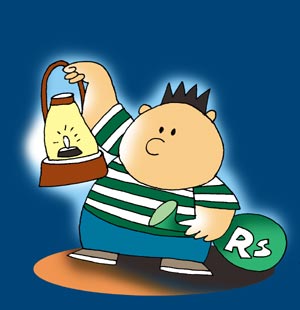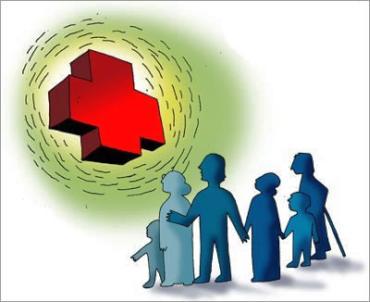
If you're in your early or mid-twenties, have begun your professional career and have a regular source of income, you need a financial plan.
Most young people use their earnings splurging on themselves, their friends and family. However, once the initial euphoria of being financial indendent wears off, you need to sit down and decide how you can manage your finances in a way that keeps you financially secure through your career and into retirement.
Now this might seem like an overwhelming task. So to help you set up a plan that will help you continue to enjoy your financial freedom, we present this guide to your first financial plan.
Get a PAN card
This should be the first step for any working professional. A PAN card is an identity card issued by the income tax department. This card is used when filing your income tax returns. Apart from this, the PAN card is also used when opening a bank account, demat account, investing in mutual funds and other financial transactions.
The required documents for getting a PAN card is a passport size photo, address proof and identification proof. You need to apply at either UTI or NSDL, which are the two agencies approved by the income tax department for issuing PAN cards.
Ramalingam K, an MBA (Finance) and certified financial planner, is founder & director of Holistic Investment Planners (P) Ltd. He can be reached at ramalingam_007@rediffmail.com

Almost every day you will find a news story about a road accident be it on TV or in the newspapers. The stories of such incidents should serve as a reminder that the accidents can happen to anyone and that the impact of these accidents on one's working life could be huge. Some accidents could reduce your employability temporarily or even permanently. A personal accident and disability insurance policy is used to cover the financial losses arising out of accident and disability.
What you need to do before getting a policy is decide the coverage amount based on the estimated loss you may suffer because of an accident. In other words, the loss you may incur from employment temporarily or permanently because of an accident.
An average policy will cost you approximately Rs 1,500 pa for a coverage of Rs 10 lakh.
Health insurance
Most people don't think about health insurance very often, but it is the first thing that comes to mind when a loved one is sick. Under health insurance, the insurance company pays the medical bills if the insured person becomes sick and is hospitalised. Health insurance can protect a family from financial difficulties in case of severe and serious illnesses.
If you have a health insurance from your employer, ensure that it is sufficient. In some cases employers may cover the employee and not his/her family members. Moreover, these policies are not portable and cannot be individualised. Employer-provided policies cannot be transferred to another employer in case you switch your job.
Also employer-provided policies will give you coverage as long as you are employed, once you retire you may not have coverage which could prove unfortunate since it is usually after retirement that people need health insurance the most. If you plan to take a fresh policy after retirement, insurance companies will not cover pre-existing diseases at that point in time.
So though your employer provides a health insurance policy it is better for you to take a separate health insurance policy at least with a small amount of coverage.
The coverage amount of the health insurance policy needs to be decided based on your health consciousness, your family health history, and the class of hospital you choose for treatments.

Generally, as a beginner, there will not be any requirement for life insurance. But if your parents are financially dependent on you, then you need to cover yourself. This is needed to ensure that in case of any mishap, your family members do not need to compromise on their lifestyle. That is why it is advisable to cover yourself with life insurance if you have dependents -- be it parents, spouse and/or children.
A word of caution here, don't fall prey to ULIP schemes. Opt instead for a pure term insurance policy. These policies give you high coverage with low premium. The premium for a sum assured of Rs 10 lakh will cost a 25-year-old only Rs 2,500 pa approximately.
Emergency reserves
Once you have completed these obligations, you need to build an emergency reserve or contingency fund. One aspect of financial planning involves planning for situations where there could be a temporary break in one's professional income. This could happen, amongst other reasons, due to ill health or could even be self-opted.
Such planning requires the creation of a contingency fund. The size of a contingency fund is linked to one's estimate of what could be the maximum duration of such a break. For instance some people plan for the possibility of a three-month break, others for six months.
This emergency fund also serves as psychological security. In case you need to quit your present job and need to search for a new one, you can do that comfortably and confidently as you have an emergency fund for the intermediate period; you need not panic. Also, if you have created a contingency fund, in the event of an emergency you need not pre-close your other investments and thus you avoid paying penalty or booking losses.

You can save up to Rs 1,20,000 under section 80 C. Out of this Rs 20,000 needs to be invested in infrastructure bonds and the balance Rs 100000 can be invested in NSCs, PPF, insurance premiums, and ELSS mutual funds.
You may choose to give the maximum allocation to ELSS mutual funds, since you have the benefit of youth and beign at the beginning of your career.
Other goals
You may have other goals like buying a laptop, higher studies and vacations. You need to plan for all these goals. You need to keep in mind two things before deciding an investment. They are your risk tolerance and time horizon.
How much risk can you afford to take and psychologically comfortable taking? When do you need this money back? Based on the answers to these questions you need to choose the right kind of investment plan.
Plan out your work and work out your plan. Beginning your financial planning early on in your career will put you in an economically sounder position as you increase you earnings and your spending as well.